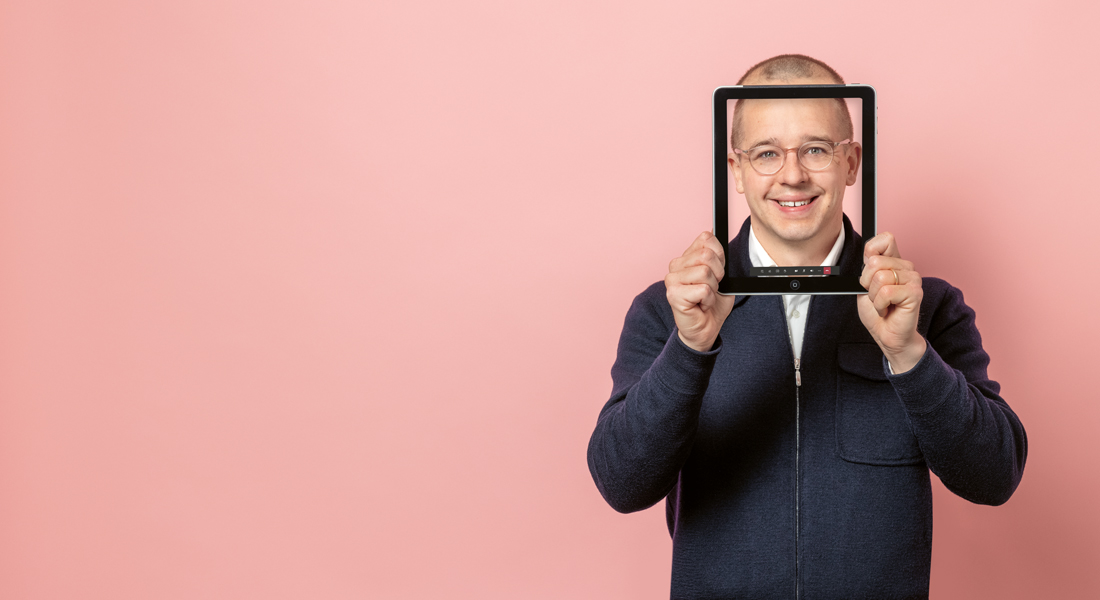“Digital meetings will never trump physical ones”
The pandemic has changed our daily lives and the way we work. Lunch with coworkers and business trips have been replaced with digital coffee breaks and Zoom meetings. But are the new routines here to stay? Psychologist Niklas Laninge predicts what trends will remain after the Covid era and which we will just want to forget.

We can all agree that the coronavirus pandemic has transformed society and us as individuals. Quick adjustments were the melody of the past year and we’ve mostly had to play it by ear. We’ve developed new ways of working—and to some degree socializing. And the increase in distance working has affected our mental health and our work-life balance.
Is it too soon to look back on the coronavirus year and see which of our new habits will stay with us? Niklas Laninge, psychologist and expert on behavioral change, has studied not only this pandemic, but also what we can learn from history.
“There have been outbreaks of disease in the past, such as the SARS epidemic, but not to the same extent as the coronavirus pandemic. There have never been such massive changes in behavior as we’ve seen now, and it’s an impressive sight.”
We have difficulty changing the habits
By nature, humans are resistant to change and we have difficulty changing the habits we’ve had every day for years. Laninge says that we also have a tendency to primarily choose behaviors that benefit us in the short term.
“We know that it’s foolish to buy a lot of new things, eat unhealthily and skip exercise, but the short-term consequences of these behaviors are often positive. That trumps the bigger picture and the long-term consequences.”
But if we can just cross the initial threshold, new behaviors can become a habit, as we’ve seen with digital meetings. Did we think digital meetings were too complicated in the past, before Covid? Or did we just prefer face-to-face? Probably the latter. Laninge says the pandemic forced us over a technological hump.
“There was already lots of technology available, but we hadn’t taken the time to learn it fully. Now we’ve practiced so long that it’s become routine and we realize it’s not that complicated at all. I’ve seen organizations that have redesigned their scheduling so that all meetings are no more than a half-hour to ensure their effectiveness and so all participants can stay focused. I love things like that! However, I think we’ve also developed things that are sub-optimal, like digital afternoon coffee breaks and digital kickoff events. No one enjoys those.”
Behaviors we’ve invested in will also stay around, Laninge thinks. Perhaps it’s the new equipment for your home gym, your lunchtime workout with your neighbor or the closet you remodeled into a home office. As a rule, we’re not willing to abandon investments we’ve made in time, money or new relationships. Changed work methods and more remote working also affect the office environment and how it is optimized based on our new needs.
“I think businesses and organizations want to adapt to more flexible work,” he says, “but they have to ask themselves, what do we want to optimize our facilities for? For collaboration? Or will the office mainly be a place where we run errands, meet with the boss or turn in our expense reports? What is clear is that it is more rewarding if the purpose is idea generation, concept development or just socializing.”
“Creativity drops"
Because the lack of creativity and social interactions is the main negative effect of the new digital way of working. A survey* by Kantar Sifo on behalf of Tele2 Business found that many say they miss colleagues and customers, and that it’s difficult to read the mood and group dynamics in video meetings.
Laninge concurs: “I can say with great certainty that creativity drops. A digital brainstorming meeting will never beat a physical one. Digital meetings are task-oriented and often lack human interaction. In addition, people can easily misinterpret each other. If our work lives are going to be primarily digital in the future, I think it will be fraught with uncertainty. What do my coworkers think of me? Is my boss happy with my performance? We see each other in digital meetings—but do we really ‘see’ each other? I think we lose spontaneity when we don’t get together in person.”
Might we even have lost a bit of our social skills now when we haven’t been spending as much time with others? Do we need to learn to become social again?
“We might feel a certain resistance for a while when someone proposes getting together on a Saturday. It may feel overwhelming to go from zero activities to something, as opposed to when we had loads of work lunches and evening activities scheduled. It will be exciting to see where our threshold for social interaction lies in the future.”
*The survey, “The hybrid working life,” was conducted in spring and fall 2020.
Niklas Laninge
Born: 1987
Background: Psychologist, expert in behavioral design, author and entrepreneur. Has started and run several businesses that combined technology and psychology.
Occupation: Head of the behavioral insights unit at the psychology group PBM. Helps organizations achieve large-scale behavioral change.
